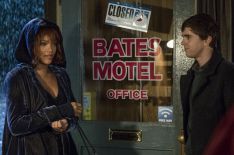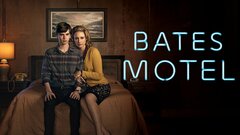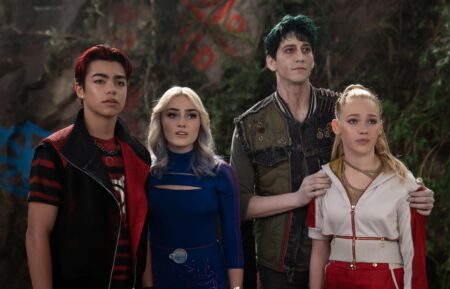‘Bates Motel’ Producers Explain Why Marion Crane Survived in Shocking Twist
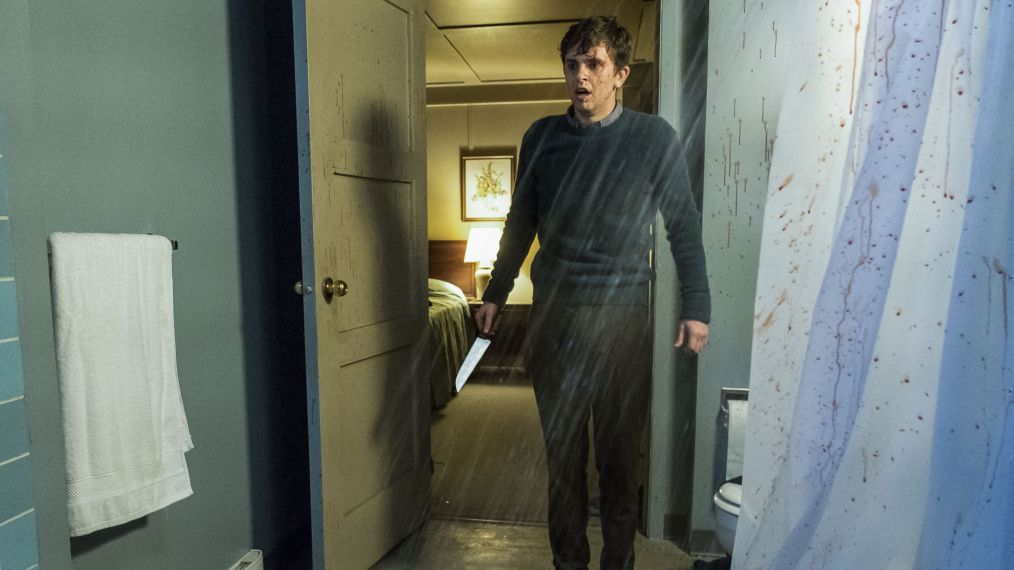
Spoiler Alert
[Spoiler Alert: If you have not watched Monday’s episode of Bates Motel, stop reading now.]
When executive producers Carlton Cuse and Kerry Ehrin said Bates Motel would be a lot more than a slavish prequel to Psycho, the iconic, 1960 movie about a doting mom named Norma Bates and her doting son Norman, they weren’t kidding. There were many new characters never referred to in the original, for instance, including Norma’s (Vera Farmiga) older son Dylan (Max Theriot), who is half brother to the troubled Norman (Freddy Highmore). And Dylan’s father, Norma’s brother Caleb (Kenny Johnson) who raped and impregnated her.
But nothing was more of a surprise than Marion Crane (Rihanna) escaping death at the hands of a delusional Norman. Instead, Norman’s shower-stabbing victim was Sam Loomis (Austin Nichols), Marion’s lover.
Cuse and Ehrin offer a postmortem of the jaw-dropping, Marion-centric March 27 episode.
Wow! The shower scene was a major departure from the movie. Some might call it blasphemous. Why did you decide to keep Marion Crane alive?
Cuse: The other word you could use is fresh. And modern. And empowered. We didn’t want Marion to be victimized. We wanted to take part of the journey that is familiar in Psycho, but we felt that in 2017, Marion deserves a different outcome.
Are you expecting some let’s say, interesting reaction to this choice?
Ehrin: We’re really pleased with this. The challenge of pulling Psycho into this season was not just redoing it and making it integrate into the story we’re telling for these characters of Bates Motel. Psycho is very much about seeing Norman from the outside; it’s the premise of the surprise. As you’re watching Norman from the outside, you don’t know what’s going on inside. This show has always been about showing people what’s going on the inside in the most intimate, human way. To take the events in Psycho and just do redo them would have felt pointless. Telling the story of Norman and him having this awareness of his own psychosis while Marion was in the hotel was much more interesting for our story.
Has Marion Crane gone off to rehab her life? Or might she be back and in danger again?
Cuse: No, she’s gone.
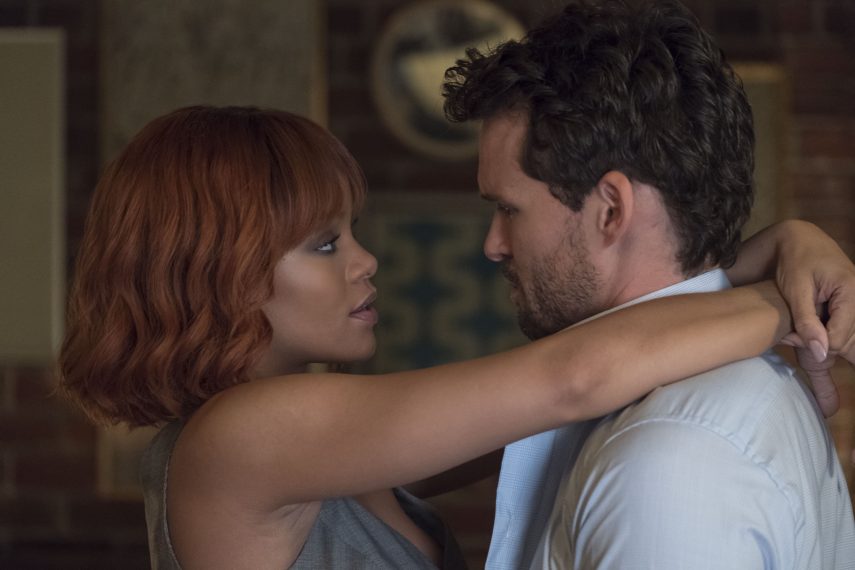
Pictured: Rihanna, Austin Nichols
You showed Norman fighting his madness and saving Marion from his compulsion to kill her, perhaps because of his recent meeting with Dr. Edwards (Damon Gupton) his former shrink, but then quickly any hopes for real change are dashed when he kills Sam Loomis. Does it matter that his victim was a cheating, lying, adulterous guy and not Marion.
Both: Yes.
Ehrin: It has more of a story point, it being a metaphor for his own father, which was the root of his dysfunction. It comes full circle back to his [abusive] father.
It would have been harder to feel compassion had Norman killed Marion instead of Sam Loomis, wouldn’t it?
Cuse: Well, yeah. Part of the overall journey of the show is to have the audience walk in Norman’s shoes. We are very conscious of what the consequences were of all the acts of violence that Norman undertakes across the course of the five seasons of the show. At the end, he’s conscious of what he did to Sam. Even though Sam is a louse, he doesn’t really deserve to be murdered, but that was a very intentional and long-planned escalation of Norman’s conscious capability for an act of violence.
We’ve heard him say after a violent act, “Mother, what did you do?” and this time, didn’t he say, “What did I do?”
Ehrin: Exactly. Some real clarity.
You also made the decision not to have Norman manifest as Norma when he killed Sam as he did in Pyscho.
Ehrin: That was the whole thing we were building to. The mirror opposite of Psycho, He was having clarity in the moment when the shower scene occurs.
Austin Nichols’s character, Spencer, was gorily stabbed to death in The Walking Dead not too long ago. Was that a casting point for you?
Ehrin: We didn’t know about that, actually. Carlton and I just found out five minutes ago. [Laughs]
Cuse: Neither one of us watch that show so we didn’t know that, but it seems to be Austin’s stock in trade this year in the television business.
Why didn’t Sam scream? Another deliberate deviation from the iconic scene?
Cuse: To me, that would feel kind of goofy. It’s one thing in 1960 for Janet Leigh to scream; it’s supposed to be a realistic depiction. We didn’t try to put every moment through the prism of the original movie. We were trying to find ways to reference it, but really have it serve our story. We didn’t want to slavishly imitate any of the scene to a place where we lose the sense of reality in our own storytelling. It’s something we were very conscious of and we didn’t want to do it.
Ehrin: Also, if you recall the shower scene, what you mostly remember is the score. It’s actually remarkably silent. Beautiful is not a word to use for violence, but it’s a beautifully made scene in that way.
Cuse: We didn’t want to use the Bernard Herman score either. We didn’t want to veer that close to the original.
You veered pretty far away with the revelation that Norman had sex with a man, under the delusion that he was a woman, his mother Norma. Were you intimating something about his sexual identity?
Ehrin: He thinks he’s Norma! [Laughs] That seems clear. ‘I’m Norma; this guy’s hot. I’m frustrated.’ Think of where Mother was at that night. Her son basically broke up with her in the end of episode 504. She’s thinking, ‘I’ve given up my entire existence to this kid,’ and she’s pissed. She goes out that night and she blows off steam. She picks up this guy and has sex with him in a car.
So you weren’t saying anything about repressed homosexuality there.
Ehrin: No. We don’t define his sexuality. He’s such an unusual and specific case that it isn’t really about that at all. In that moment, it was about his being inside of mother and people can interpret it however they like, really.
What can we expect when Norman’s brother Dylan returns home now that he knows Norma is dead?
Ehrin: That’s a huge part of the story coming up is Dylan being pulled back into that web that he tried to get away from; it’s explosive. A lot of this season has been about, for many different reasons, how these characters have spiraled out at the end of the last season. They all, in different ways, get pulled back in this season.
Speaking of spiraling out—poor Romero (Nestor Carbonell). He’s been through hell to get revenge on Norman for killing his love Norma. Is he still bent on making Norman pay?
Cuse: Fully. That’s what’s driving that character. He’s fully committed to killing Norman Bates or die trying. We’re going to find out which way that goes by the end of the season. He’s hell-bent on revenge and that’s completely driving him.
The very strange character of Chick (Ryan Hurst). Lots of fans are into the theory that because he wants to use his relationship with Norman to write a book about him and Norma that he’s a stand-in for Robert Bloch, the writer of the novel Psycho.
Cuse: That was an intentional meta-reference when he says he’s writing a book and it might make a good movie. He is kind of our proxy for Robert Bloch, who, from a distance, observed the story of a serial killer named Ed Gein in Wisconsin. It seemed a very fitting thing to make Chick have this role in our story and pay homage on a bigger level to the fact that, while Hitchcock made the movie, Robert Bloch was the writer who birthed this into existence.
Since you’ve broken with the movie’s mythology, especially in the murder of Sam, could Bates Motel not end with Mother completely taking over a catatonic Norman? Is another option possible?
Cuse: I think it would be very disappointing if we just ended our show exactly the same way that the movie ended. While we’ve had fun including elements of the original Psycho narrative, we’re telling our own story. And our own story has its own ending.
Bates Motel, Mondays, 10/9c, A&E

